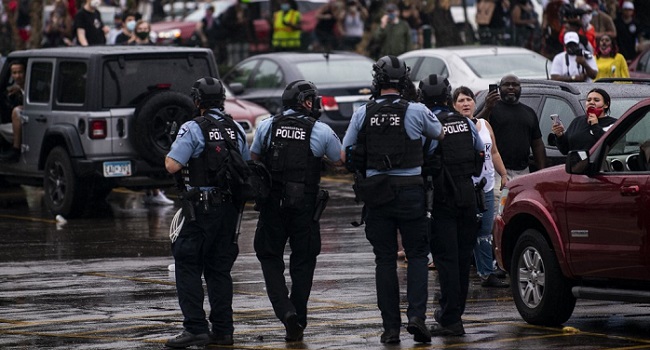
‘I am my brother’s keeper’, Philonise Floyd tells UN rights body, in plea for racial justice

The UN Human Rights Council in in Geneva heard powerful testimony from the brother of George Floyd, whose death, captured on video, while a police officer knelt on his neck for over eight minutes in Minneapolis, has sparked worldwide protest.
In a pre-recorded appeal to the Council to set up an international probe to investigate killings of Black people in America, and violence against demonstrators, Philonise Floyd urged the United Nations to act.
Echoing that message, UN Deputy Secretary-General Amina Mohammed said: “Today, people are saying, loudly and movingly, ‘Enough.’ The United Nations has a duty to respond to the anguish that has been felt by so many for so long.
“This cause is at the heart of our Organization’s identity. Equal rights are enshrined in our founding Charter. Just as we fought apartheid years ago, so must we fight the hatred, oppression and humiliation today.”
‘I am asking you to help us. Black people in America’
Mr. Floyd delivered his message in the Council’s first Urgent Debate on racism, alleged police brutality and violence against protesters, who have marched by the million, after being sickened by the manner of George Floyd’s death, called by the African Group of nations.
“You watched my brother die. That could have been me,” he said in an impassioned recording. “I am my brother’s keeper. You in the United Nations are your brothers’ and sisters’ keepers in America, and you have the power to help us get justice for my brother George Floyd. I am asking you to help him. I am asking you to help me. I am asking you to help us. Black people in America.”
Addressing the Council at the start of the debate, UN High Commissioner for Human Rights, Michelle Bachelet, struck a similarly urgent tone. “Time is of the essence. Patience has run out,” she said. “Black lives matter. Indigenous lives matter. The lives of people of colour matter. All human beings are born equal in dignity and rights and that is what this Council, like my Office, stands for.”
Reminding the Council’s delegates of the circumstances surrounding his 46-year-old brother’s death on 25 May in Minneapolis, Mr. Floyd noted that even after he was “unconscious, stopped moving and stopped breathing, the officer kept his knee on my brother’s neck for another four minutes as many witnesses kept begging the officer to take his knee off of my brother’s neck and save his life.
‘No mercy, no humanity’
“The officers showed no mercy, no humanity and tortured my brother to death in the middle of the street in Minneapolis with a crowd of witnesses watching and begging them to stop, showing us black people the same lesson yet again: black lives do not matter in the United States of America.”
Ms. Bachelet called for the reform of specific institutions and law enforcement agencies across the world, and measures to address the “pervasive racism that corrodes institutions of government, entrenches inequality and underlies so many violations of human rights”.
‘Lethal harm’ results ‘too often’
“Gratuitous brutality has come to symbolise the systemic racism that harms millions of people of African descent”, she said, adding that it causes “pervasive, daily, life-long, generational and too often lethal harm”.
The urgent debate, only the fifth to take place since the Council began its work in 2006, was initiated by the Council’s African Group, after a call from more than 600 rights groups to investigate alleged police violence after Mr Floyd’s death.
In a call for reform and notably a renewed commitment to the implementation of key pledges taken to combat racism in in 2002 at the Durban World Conference Against Racism, Racial Discrimination, Xenophobia and Related Intolerance, Ambassador Samba added that it was “unacceptable” to still have to be “talking about and fighting for equality for some people 72 years after the adoption of the Universal Declaration of Human Rights which proclaims that all people are born free and in dignity”.
In a session marked by expressions of sympathy for the family of George Floyd, speakers also addressed the issue of violence against protesters – a matter also raised by Philonise Floyd.






